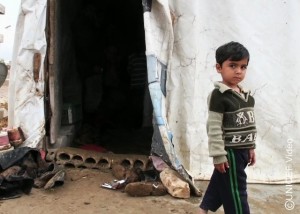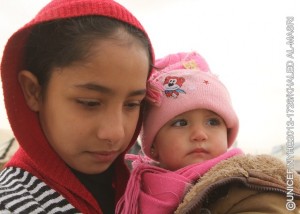在黎巴嫩,「过冬计划」援助面临恶劣天气的叙利亚难民
2012-12-21
在此营地生活的难民,更确切地形容的话,在此「求生」的难民,几乎都是身无长物。他们从黎巴嫩边境穿越到此。随着冬季来临,这里的温度往往降至摄氏0度以下,並时常下雪。
前天,倾盆大雨浇透了帐篷,让难民原本艰难的生活环境雪上加霜。这些棚屋由硬纸板、塑胶和石头临时搭建而成,根本无法抵御寒冬。儿童要在鞋子外面套上塑胶袋,以防泥泞弄髒鞋子。
 |
 |
截至2012年12月19日,联合国难民署估计超过16.3万人正在黎巴嫩,登记或等待登记成为叙利亚难民。
然而,相信实际数字远高于此,因为许多叙利亚人基于人身安全或其他原因,未有登记。黎巴嫩已成为该地区中,接收叙利亚难民人数最多的国家之一。
约3.5万名0至14岁流离失所的叙利亚儿童,现正位处黎巴嫩北部和贝卡地区,这些地区都正面临极端的寒冬。上周,约270名在黎巴嫩避难的叙利亚难民急需入院救治,突显了身处在叙利亚的难民家庭活于绝对之中,生活条件有多危险。随着寒冬迫近,联合国儿童基金会(UNICEF)的首要任务就是帮助这些儿童保暖,保障他们的的安全和健康。
权宜之计
自2012年9月起,12岁的亚海亚(Yahya)*和他的家人在这所营地寻求庇护。亚海亚一家沒有毯子,亦沒有钱买木柴,只能依靠起初搭建的烟囱,烧一些在垃圾堆或路上捡到的塑胶抵御寒冷。
亚海亚说:「我们沒有东西可用来取暖。大家都要取暖,但都沒有办法。我们只需要毯子保暖,但我们连一条毯子都沒有。」亚海亚现在还穿着刚抵达黎巴嫩时穿的衣服,但根本不足以抵御寒冷的天气和雨水。
| 哈南(Hanan)和她的家人缺少基本的个人及环境衞生设施。厕所是基本设施,但她们的「厕所」,通常只是在地上挖一个坑。 丽娜(Lina)家的「厕所」溢出粪便,令周围变成了一个污水沟。她表示:「都氾滥了!下雨的时候,雨水流进厕所,夹杂着粪便涌了出来。所以我们不得不另挖一个坑。我们还能做些什么呢?」 |
 |
厕所「氾滥」,令细菌肆意传播,再加上无法保持适当的个人及环境衞生,令营地的水媒疾病如肝炎和霍乱的传染风险都相当高。
在贝卡谷地内一个名为亚道斯(Adous)的偏远小村庄,一名黎巴嫩居民阿布德.穆斯塔法(Abood Mustafa)表示入院人数不断上升,恐怕冬季的入院人数会只增不减。他说:「我们尽力帮忙,砍伐了一些树木。我们正在想办法解决问题……但是仍有许多人沒有水箱、滤水器、毯子或床褥。他们穿越边境进入黎巴嫩时,基本上是一无所有。」
帮助有风险的家庭
| UNICEF及其合作伙伴正在黎巴嫩推行一项「过冬计划」,为阿卡尔(Akkar)、黎巴嫩北部和贝卡谷地的难民提供保暖衣物。UNICEF已开始为叙利亚难民儿童提供冬季衣服。组织正援助3万名儿童,其中一半儿童收到的保暖衣物套装,内有鞋、袜子、裤子、外套、帽子、手套和紧身衣,另一半儿童收到在附近市场购买服装的现金代用券。 叙利亚难民还将收到毯子、塑胶薄膜、家庭衞生箱和婴儿用品箱。有关人员正计划分发药品和营养用品。 据UNICEF驻黎巴嫩的供应和物流专员奥利维尔.穆莱特(Olivier Mulet)表示,难民身处的情况每天都在恶化,因此时间十分紧迫,他说:「我们检视了当地市场的需要,决定发放现金代用券,因为这种方法收效非常快。」 |
 |
*为保护儿童身份,文中人名均为化名。
您的捐款能够拯救儿童的生命!
 |
 |
 |
| 港币194元 为3个月大婴儿提供御寒衣物 | 港币438元 为儿童提供1套保暖衣物套装 | 港币826元 为15名婴儿提供毛毯 |
| 请即捐款! |









